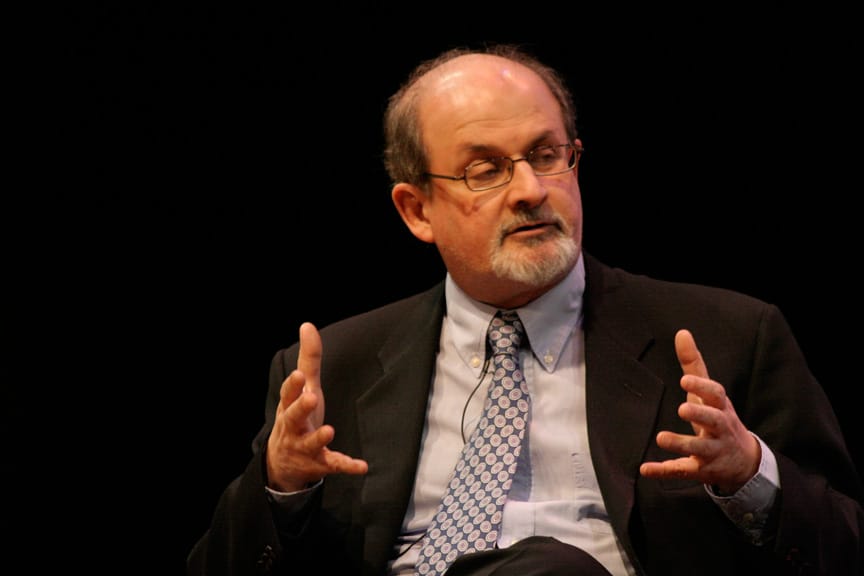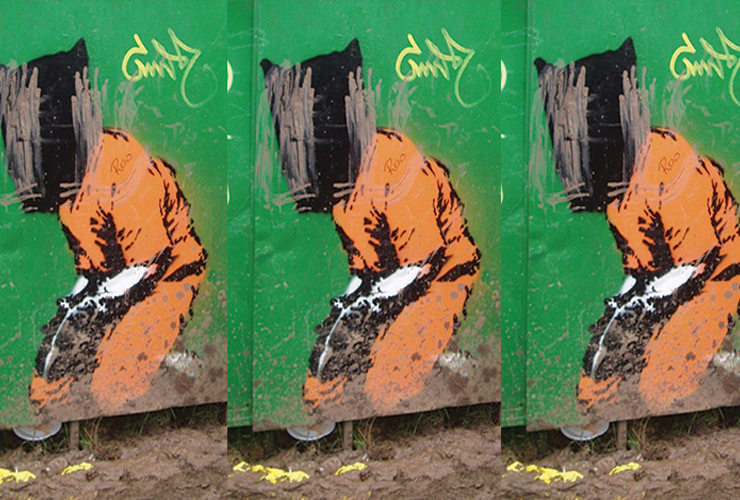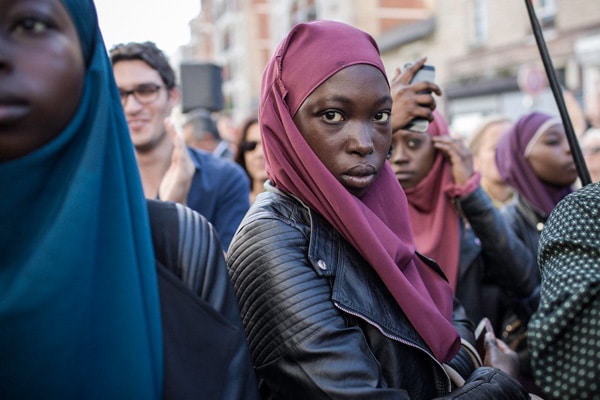The brutal attack on novelist Salman Rushdie at a public lecture in Chautauqua, New York, last month has prompted a flood of revealing responses from liberals in the West. In the New Yorker, Adam Gopnik decried the enduring “terrorist” threat to “liberal civilization” in rhetoric that might well have been issued by the administration of George W. Bush. (Even law enforcement has declined to link the assault to terrorism.) Meanwhile, Graeme Wood, writing in the Atlantic, likens criticism of texts to complicity in assassination, while Bernard-Henri Lévy’s predictable diatribe against fanaticism calls for a “campaign” to “ensure” that Rushdie wins this year’s Nobel Prize in Literature—a cause New Yorker editor David Remnick has now joined, too. If it shocks us that the novelist was attacked after so long, it should also shock us that this commentary looks much the same as it did when his life was first threatened more than thirty years ago.
The defining feature of this genre of liberal exasperation is a dogmatic repudiation of history. In place of careful analysis of particular (and therefore changing) circumstances, it relies on stereotype and anecdote to depict a metaphysical conflict between religious fanaticism and liberal tolerance—one that is always and everywhere the same.
The erasure of context is striking. You will search these pieces in vain for any distinction between the original protests following the September 1988 publication of The Satanic Verses and Ayatollah Khomeini’s call for Rushdie’s death months later, in February 1989. The effect is to obscure perhaps the central historical question: how, exactly, the publication of Rushdie’s novel became a global geopolitical phenomenon that resulted in the threat to his life.
You will also search in vain for even the most basic awareness of Muslim legal history and culture, passing familiarity with which can’t help but revise one’s understanding of the Rushdie affair. It is no surprise that these commentators persist in using the wrong terminology by calling Khomeini’s pronouncement a fatwa; as the Washington Post explained two and a half decades ago, it was in fact a hukm. (A fatwa is issued by a religious authority in response to a hypothetical question and possesses no legal force, while a hukm, or decree by the head of state, represents the intervention of a government.) It was the Western press, not Iran, that insisted on calling the declaration of fatwa—a tellingly ignorant but typical conflation of politics and religion (and exactly what liberals accuse Muslim fanatics of doing).
Nor does the liberal conceit of an unchanging battle between fanaticism and tolerance illuminate the specific Muslim arguments against Rushdie, which were more about secular hurt than sin. Rushdie’s American attacker, born in California and living in New Jersey, undoubtedly believed he was defending Islam, but his motivations share a great deal with his country’s more familiar culture of violence. By all accounts he was fixated by a marginal cause, one that has been of no interest to recent Sunni militancy and is not a live issue in Shia Iran, either. Apart from some official glee in Tehran and some scattered support on social media, the attack was more or less ignored by Muslims globally. In short, Rushdie was correct in thinking there was no longer a systematic threat against him.
Perhaps the most glaring context omitted from these accounts, given their banal propagandizing on behalf of free speech, are the threats to free expression with which this anti-Islamic rhetoric is linked—from the radical diminution of the civil liberties of all Americans (to say nothing of the human rights of non-Americans) in the West’s post–9/11 security states, carried out in the name of the War on Terror, to the U.S. government’s hunting down of Julian Assange, Edward Snowden, and Chelsea Manning. These responses to the challenge of global Islam, inaugurated by the Rushdie affair at the end of the Cold War, represent threats to freedom wider and more profound than the easy contrast between fanaticism and tolerance can explain.
The first thing to note about the Rushdie affair is that it had little to do with theology. While Islamic tradition does proscribe abusing sacred figures, its terms and debates have rarely featured in the controversy or since. Occurring initially among Muslims of South Asian descent in Britain, and then moving back to India and Pakistan, the first protests against The Satanic Verses deployed a nineteenth-century colonial vocabulary that had been enshrined in the Indian Penal Code of 1860. Itself a secular document meant to allow the British to govern a religiously diverse society, the code disavowed blasphemy and penalized hurting religious sentiments instead. It was this specifically South Asian terminology about the hurt sentiments of believers in all religions, not the true faith of one, that was globalized in the Rushdie affair.
Muslim protests and violence over insults to Muhammad first emerged in colonial India during the middle of the nineteenth century. They had to do with the creation of a market in publishing through mass circulation by way of the printing press. Rather than any traditional dispute between theologians, in other words, press stories about Muhammad not only lacked theological import but were addressed to an anonymous public. They were justified on the grounds of free speech, itself modeled on free trade in proposing the market as a site at which true value, whether economic or religious, emerged through the impersonal operation of an invisible hand—that is, through the marketplace of ideas. Given the unavailability of political freedoms in colonial societies, Muslim protesters took the market as their arena of operations. Accepting its non-religious character, they invoked a protectionist argument, asking for their hurt sentiments to be recognized in the same way as libel and defamation laws did for other kinds of offensive speech under British law.
The only theological category in these debates was the idea of an invisible hand. The title of Rushdie’s novel refers to a contested incident from the life of Muhammad, when he briefly agreed to compromise with his polytheist rivals by agreeing to accept their goddesses as intercessors with God. Soon, however, he declared the verses recognizing them in the Quran as a satanic interpolation. Whether Satan could interrupt God is a real theological question, and Rushdie made brilliant use of this anecdote to reflect upon the meaning of literary creation and authorship. Tellingly, however, complaints against Rushdie never focused on this theological reference. His Muslim critics were only interested in a dream sequence where the women in a house of prostitution were given the names of the Prophet’s wives.
Why did theological debate suddenly give way in the nineteenth century to a focus on Muhammad as amenable to insult and offense?
Islam’s modernization in colonial times meant its rationalization, which involved stripping the Prophet of many superhuman traits to make him a perfect, though fully mortal, figure. Muhammad came to be seen as a model father, husband, and statesman, allowing his followers to identify with him. While God, who retained his transcendence, could neither be identified with nor insulted, the all-too human prophet had become vulnerable to any perceived abuse. Correspondingly, Muslims could take offense. This was an issue in which theology could only play an indirect role, chiefly by way of Christianity in using the term blasphemy. We should recall that one of the demands of British Muslim protesters in 1988 was that their sanctities be included in the UK’s since rescinded blasphemy laws that had hitherto protected only the Church of England.
The Muslim protesters, then and now, offer no alternatives to liberalism but ask only for what they see as inclusion into it. Such demands take the form of protectionist measures in the marketplace of ideas modeled on libel and defamation law or invoking Christian notions of blasphemy. It is liberalism’s hypocrisy and betrayal at failing to accommodate them, not liberalism as such, that fuels their rage which in addition is meant to exemplify the violent consequences of an unregulated market. The loss of self-control that that is said to define Muslim rage, in other words, mirrors the lack of control in the marketplace of ideas. This is hardly the great metaphysical battle between fanaticism and tolerance that commentators have conjured since 1989, and it must be understood as a conflict within liberalism itself. In the absence of a theological register, the violence of Muhammad’s defenders might even be described as a failure of language itself. Only very recently in Pakistan has this liberal vocabulary been supplemented by Islamic theological categories like apostasy and martyrdom to justify violence against those allegedly insulting Muhammad—a result of competition between rival Muslim groups to take control of the market in which the Prophet has become a commodity.
Rushdie and his novel became incidental to Muslim debate after Khomeini stepped into the controversy and made it a geopolitical issue in February 1989. The year is significant. The Rushdie affair emerged at the end of the Cold War and the dismantling of the grand narrative of bipolar conflict. Issues of culture and identity came to the fore in new forms of nationalism and religion and in renewed political and cultural contests around race, gender, and sexuality. The globalization of protests about Muhammad, in other words, unfolded against the backdrop of America’s emerging culture wars in the late 1980s as well as the return of the antagonisms so clearly articulated in Samuel Huntington’s influential 1993 essay, “The Clash of Civilizations,” which later became a best-selling book.
Leaving behind the state-centered parties and ideologies of the Cold War for a politics in and of the social, the culture wars became premised upon the neoliberal erasure of any distinction between state and society. Submitting both domains to the logic of the market had the effect of dispersing conflict among individuals and groups. In one case, an impossible theology gave rise to violence, and in another an impossible politics produced new forms of social discipline outside the state. The “cult of offense” that writers like Wood rail against is not a symptom of any particular political orientation, left or right. It is the product of neoliberalism.
The Rushdie affair thus signaled the coming together of a post-colonial narrative with a neoliberal one, both dominated by the focus on marketized social relations and hurt sentiments. In a bitter irony, Rushdie’s attempt to give voice to immigrant lives and experience in The Satanic Verses was fulfilled by protests against it in Britain that for the first time gave Muslims a public platform. It marked a shift from race and nationality to religion as defining immigrant identity.
Khomeini dispensed with these culture wars and made the Rushdie affair into a political issue for the first time. He seems to have been aiming to consolidate his authority among Sunni Muslims in the aftermath of the Iran-Iraq war by defending the Prophet, who for the Shia plays the secondary role of announcing the Imam Ali. The Ayatollah had earlier dismissed Muslim complaints against Rushdie as a distraction, only to change his mind once a number of those protesting the novel were killed by police firing in Pakistan. Far more numerous than the unfortunate translators and publishers of The Satanic Verses killed or attacked by Rushdie’s enemies, these men are rarely mentioned and never mourned in Western commentary. Presumed to be fanatics, their deaths, for which nobody is held culpable, are collateral damage in the fight for free expression. In issuing his sentence against Rushdie, Khomeini not only took these deaths seriously but threatened for the first time to reciprocate the impunity of Western countries in killing or tolerating the deaths of civilians elsewhere.
Rushdie himself seemed to have changed places with his own characters. Like the figures in his novel who are changed into animals as a result of racist perceptions, he became a demon in the eyes of many Muslims. Conversely, Rushdie was made into an example of tolerance and even Western civilization by his liberal defenders—a symbolic role in a metaphysical battle that has likely endangered him further. Like Mahound in The Satanic Verses, Rushdie also sought a compromise with his enemies by briefly recanting his book and claiming to have become a good Muslim. As with the novel’s prophet, this has not shaken the faith of his admirers. In such ways Rushdie has been forced to live the life of a figure he is accused of insulting.
Condemned either as liberal prophet or religious demon, Rushdie has become a larger-than-life figure known more for his ordeal than for his literary career. His ordeal has also pushed Rushdie to adopt some unfortunate views, including supporting the disastrous War on Terror. But then, like Muhammad, Rushdie is only human.
He has since returned to an earlier version of himself and speaks out against the persecution of minorities, including the Muslims of his native India who had been the first to ban his book. This generosity of spirit can only be admired, and we must hope Rushdie makes a quick recovery—not least so that he continues to stand as a global representative for the freedom of conscience and expression. Making him the victim of a metaphysical battle between tolerance and fanaticism can only inhibit his work on this front, however, because it entails a false reading both of the Rushdie affair as well as the modern history of threats to speech which need to be thought about more expansively and in connected ways.
In the end, there are really two debates here: one about geopolitics and the behavior of liberal states, and one about social identity and the fight for cultural respect. We would do well to resist the neoliberal pressure to conflate them, as Khomeini did in his own way. While both seem intractable, each is arguably capable of resolution if dealt with separately. The political debate should be engaged not by invocations of Western values and civilization, which have long been seen as hypocritical in the world beyond, but through tough diplomacy about the real issues involved. Such engagement requires careful attention to the circumstances of history, rather than their ideological erasure. As for the social debate about offenses against religious, racial, sexual, and other identities, we must reject the neoliberal cultural wars—in which Islam is the chief among several offended as well as offending groups—for a vision of the social that rises above the marketized competition of hurt sentiments.
As we know all too well from contemporary America, social relations in the liberal West need to be rebuilt. But doing so requires understanding the controversies that derange them in more complex terms than those supplied by the banal and historically inaccurate opposition between fanaticism and tolerance.








